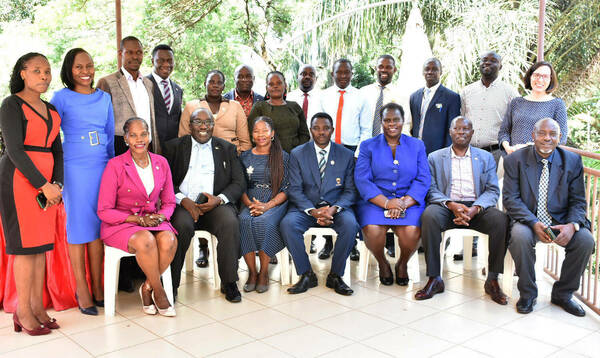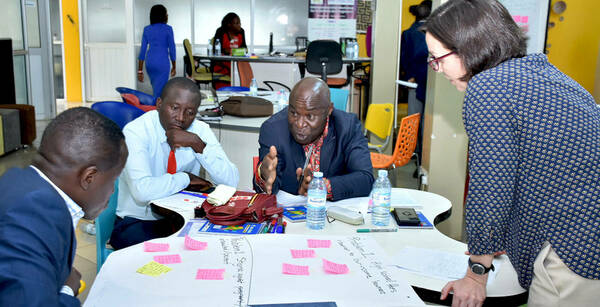Non-state schools play a substantial role in providing elementary education in Uganda. Nearly 60 percent of the country’s schools are private, and pre-primary education is exclusively private sector-led. Over the next few decades, demand for pre-primary and primary education will only grow in the landlocked East African country. Uganda has one of the world’s youngest populations, with nearly half of the population under 15.
 Participants at the Non-State School Policy Dialogue Workshop hosted by the ResilientAfrica Network (RAN) at Makerere University School of Public Health in June 2023. Credit: Makerere University - RAN
Participants at the Non-State School Policy Dialogue Workshop hosted by the ResilientAfrica Network (RAN) at Makerere University School of Public Health in June 2023. Credit: Makerere University - RANAccording to a 2018 study by the African Institute for Development Policy and the University of Southampton, demand for primary schools could increase from 8 million learners in 2015 to 17 to 20 million by 2065. Because non-state schools comprise a large share of pre-primary and primary educational institutions, efforts to ensure access to quality basic education in Uganda must understand the current level of access to and quality of non-state schools.
The COVID-19 pandemic disrupted the Ugandan education sector substantially, with schools closed for longer than anywhere else in the world — 22 months. This closure significantly impacted children’s learning, re-enrollment, and non-state schools’ financial sustainability.
In consideration of Uganda’s unique circumstances, the Uganda Non-State Schools Assessment set out to evaluate the quality, access, regulation, and economic sustainability of non-state urban pre-primary and primary schools following the 22 months of COVID-related closures through surveys at 642 randomly sampled schools and key informant interviews.
The external review was done as a part of SHARE (Supporting Holistic and Actionable Research in Education), a five-year cooperative agreement with USAID’s Bureau for Development, Democracy, and Innovation and the Pulte Institute to advance global learning priorities to improve educational outcomes.
ADVANCED ASSESSMENT: FINDINGS
-
Education quality was supported by a drive to prioritize academic achievement to attract clients, responsiveness and engagement with parents, and a high level of school-based support and oversight of learning. However, COVID-19-related school closures led to learning loss and educational gaps, mental health problems for children of school-going age and inadequate psychosocial support at schools, loss of teaching staff, and challenges with learning recovery and catch-up.
-
Barriers to access for marginalized learners include school fees, a lack of accessible infrastructure and learning materials for learners with disabilities, and few teachers trained in inclusive education (less than 20 percent per school). Ninety-five percent of parents reported reduced access to NSSs due to the financial burdens resulting from COVID-19, which also led to a rise in child labor (especially among male learners) and increases in pregnancy and child marriage for female learners. Faith-founded schools subsidized many more students’ fees than other NSSs.
-
A lack of human and financial resources for inspections impeded non-state school oversight and regulation. This resulted in a lack of accountability and mechanisms for enforcing adherence to education policies and standards.
-
Schools’ financial sustainability was inhibited by their dependence on learner fees and a decline in enrollments during and after the pandemic. Many schools with outstanding loans or renting property closed. Furthermore, not-for-profit or low-fee schools pay the same taxes as high-fee and for-profit schools, thus inhibiting the financial sustainability of non-state schools.
Looking to the future, Dr. Roy William Mayega, Principal Investigator and Deputy Chief of Party at Makerere University School of Public Health-ResilientAfrica Network (RAN), highlighted the need for new processes. “The system for collecting school-level education-management information system data is largely paper-based, causing delays in data sharing and access. We must simplify the digitization of education information to enhance the timely access of education-related data.”
 Pulte Senior Technical Associate Director Nancy Rydberg works with partners at the Resilient AfricaNetwork (RAN) to unleash the team’s creativity to solve the complex challenge of directing more funding to Uganda's non-state schools. Credit: Makerere University - RAN
Pulte Senior Technical Associate Director Nancy Rydberg works with partners at the Resilient AfricaNetwork (RAN) to unleash the team’s creativity to solve the complex challenge of directing more funding to Uganda's non-state schools. Credit: Makerere University - RANIMPACTS AND POLICY DIRECTIONS
The Ugandan Commission on Private Schools is using SHARE’s research findings to introduce reforms in taxation policy and other changes to improve the operating environment for private schools within the country.
Pulte Institute team, together with research partner ResilientAfrica Network (RAN), facilitated a policy dialogue with key actors from the Ministry of Education and Sports, the Ministry of Gender Labour and Social Development, and private school associations as they gathered feedback on a successful tax model that would facilitate the growth of non-state schools.
“Emerging from this researcher, practitioner, and policymaker dialogue is a commitment to improving pre-primary and primary school access to traditionally marginalized groups,” Primary Investigator and Pulte Institute Senior Technical Associate Director Nancy Rydberg said. “These leaders hope to pass policy to provide tax exemptions for schools that subsidize low-income learners and invest in enhancing accessibility for learners with disabilities.”